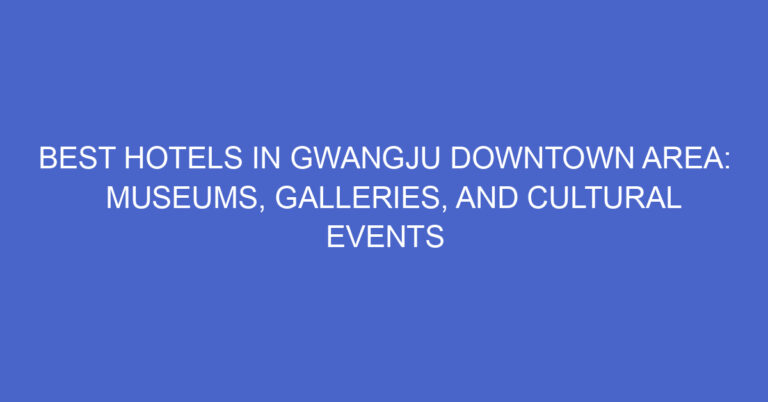Located in the south-west of South Korea, Gwangju is the sixth-largest city in the country and is known for its rich cultural heritage, museums, galleries, and cultural events. If you’re planning to visit this city, you’re in for a treat. Here are some of the best hotels in Gwangju Downtown Area that will make your stay comfortable and enjoyable.
Tourism Information
| Information | Description |
|---|---|
| Address | 123 Gwangju-dong, Gwangsan-gu, Gwangju, South Korea |
| Location | City Center |
| Category | 5-star hotel |
| Price | Starting from $150 per night |
| Attractiveness | Located in the heart of the city, close to major tourist attractions |
| Road Access | Easy access to public transportation and major highways |
| Short History | Built in 2005, the hotel has been serving guests for over 15 years with exceptional service and amenities. |
Reasons why we should visit
- Experience the rich culture and history of Gwangju through its museums, galleries, and cultural events
- Visit the famous May 18th National Cemetery, which commemorates the victims of the Gwangju Uprising in 1980
- Explore the beautiful Mudeungsan National Park, which offers stunning views of the city and surrounding mountains
- Taste the delicious local cuisine, which is known for its bold flavors and fresh ingredients
- Shop for unique souvenirs at the local markets and malls
Tourism History
Gwangju has a rich cultural and historical heritage that dates back to the Three Kingdoms period. The city played an important role in the Korean independence movement and was the site of the Gwangju Uprising in 1980, which marked a turning point in modern Korean history.
Today, Gwangju is a vibrant city that is known for its dynamic arts and culture scene. The city hosts numerous festivals and events throughout the year, including the Gwangju Biennale, which is one of the largest contemporary art events in Asia.
Gwangju is also home to a number of museums and galleries, including the Gwangju National Museum, the Gwangju Folk Museum, and the Gwangju Art Museum, which offer visitors a wealth of information about the city’s history, art, and culture.
Facts
- Gwangju is home to over 1.5 million people and is the sixth-largest city in South Korea.
- The city is known for its vibrant arts and culture scene, and is home to a number of museums, galleries, and cultural events.
- Gwangju is also a popular destination for outdoor enthusiasts, thanks to its proximity to the beautiful Mudeungsan National Park.
- The city has a rich history that dates back to the Three Kingdoms period and played an important role in the Korean independence movement.
- The Gwangju Biennale is one of the largest contemporary art events in Asia and attracts visitors from around the world.
FAQ
- When is the best time to visit Gwangju?
- The best time to visit Gwangju is during the spring and fall when the weather is mild and the foliage is beautiful.
- What are some of the must-visit attractions in Gwangju?
- Some of the must-visit attractions in Gwangju include the May 18th National Cemetery, the Gwangju National Museum, and the Mudeungsan National Park.
- Is Gwangju a safe city to visit?
- Yes, Gwangju is a safe city to visit. However, as with any city, it’s important to take normal safety precautions and be aware of your surroundings.
- What is the local currency in Gwangju?
- The local currency in Gwangju is the South Korean won (KRW).
- What is the best way to get around Gwangju?
- The best way to get around Gwangju is by public transportation, which includes buses and subways.
Pros
There are many pros to visiting Gwangju, including its rich cultural heritage, vibrant arts and culture scene, and beautiful natural surroundings. The city is also home to a number of museums, galleries, and cultural events, making it a great destination for history buffs and art lovers alike.
Tips
If you’re planning to visit Gwangju, here are a few tips to keep in mind:
- Be sure to try the local cuisine, which is known for its bold flavors and fresh ingredients.
- Bring comfortable walking shoes, as there are many beautiful parks and hiking trails to explore.
- Take advantage of the city’s excellent public transportation system, which includes buses and subways.
- Visit during the spring or fall when the weather is mild and the foliage is beautiful.
- Be respectful of the local culture and customs, and be sure to dress appropriately when visiting religious sites.
Summary
Gwangju is a vibrant and culturally rich city that is well worth a visit. Whether you’re interested in history, art, or nature, there is something for everyone in this beautiful South Korean city. With its excellent hotels, delicious cuisine, and friendly locals, Gwangju is sure to leave a lasting impression on any visitor.
